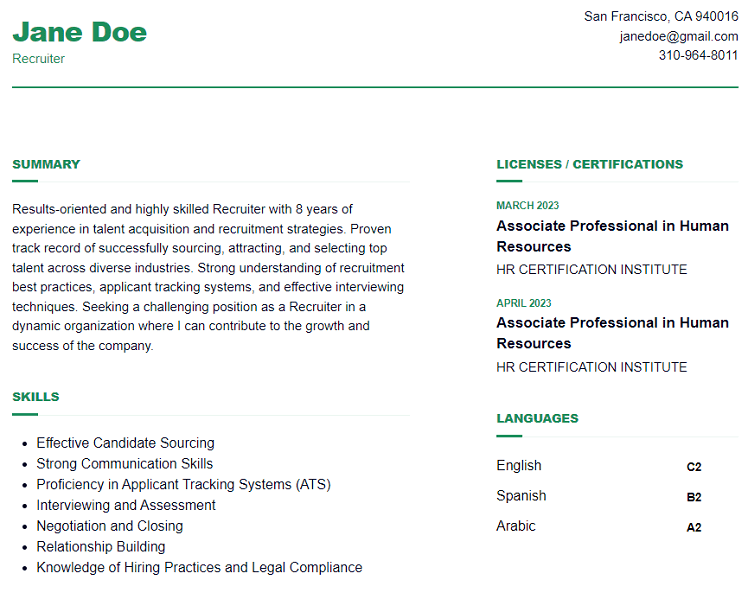Recruiters play a vital role in this process, acting as talent acquisition experts who identify, evaluate, and hire the best candidates for various positions.
To succeed in the field of recruitment, it is essential to possess a specific set of skills that make you stand out from the crowd. A recruiter’s primary responsibility is to source, screen, and select candidates who align with the organization’s requirements. They collaborate with hiring managers, conduct interviews, negotiate job offers, and build strong relationships with candidates. A recruiter must possess a deep understanding of the industry, job market trends, and legal compliance to ensure fair and unbiased hiring practices.
This article will explore the key skills needed for a recruiter’s resume and provide insights on how to showcase these skills effectively.

Table of Contents
Key Skills for a Recruiter Resume
Strong Communication Skills
As a recruiter, effective communication is paramount. Excellent verbal and written communication skills enable recruiters to build rapport with candidates, understand their career aspirations, and clearly articulate job requirements. Furthermore, recruiters must possess active listening skills to grasp candidates’ motivations and provide valuable insights throughout the hiring process.
Example: “Skilled in cross-cultural communication, adapting communication style to effectively engage with candidates. Proficient in written communication, including drafting professional emails, reports, and documentation.”
Effective Candidate Sourcing
Recruiters need to be proficient in candidate sourcing techniques, including utilizing job boards, social media platforms, professional networking sites, and talent databases. The ability to identify passive candidates and engage them through compelling outreach messages is a valuable skill for recruiters.
Example: “Proven expertise in sourcing candidates through various channels, including job boards, social media platforms, professional networks, and referrals.
In-depth knowledge of advanced search techniques, Boolean logic, and innovative sourcing strategies to identify and attract top talent.”
Proficiency in Applicant Tracking Systems (ATS)
The use of applicant tracking systems (ATS) is widespread in recruitment processes. Around 98% of Fortune 500 companies and a significant number of small and mid-sized businesses use ATS to manage candidate data and streamline hiring processes.
Recruiters rely on Applicant Tracking Systems (ATS) to manage their work efficiently. Highlight your experience and familiarity with popular ATS platforms, such as Taleo, Workday, or Greenhouse. This demonstrates your ability to navigate and utilize technology to streamline sourcing, screening, and candidate management.
Example: “Extensive experience utilizing leading ATS platforms, including Greenhouse, BambooHR, ZipRecruiter, Pinpoint. Expertise in creating and managing candidate profiles, ensuring accurate and up-to-date information within the ATS. Skilled in configuring and customizing ATS workflows, streamlining the recruitment process and improving efficiency.”
Interviewing and Assessment
Conducting interviews and assessing candidates’ suitability for the role are crucial skills for recruiters. They must have the ability to ask insightful questions, evaluate competencies, and analyze cultural fit. Implementing structured interview processes and utilizing assessment tools enhance the recruiter’s ability to make informed hiring decisions.
Example: “Utilized behavioral and competency-based interviewing techniques to evaluate candidate skills and experiences. Developed and implemented assessment methods, including structured interviews, psychometric tests, and work simulations.”
Negotiation and Closing
Recruiters often act as intermediaries between candidates and employers during the negotiation and closing stages. Skilled recruiters can negotiate job offers, compensation packages, and benefits while ensuring alignment between both parties. They possess persuasive skills to convince candidates to accept offers and successfully close the hiring process.
Example: “Strong skill in effectively communicating offer details, including compensation, benefits, and other terms, to candidates. Experience in managing and resolving salary negotiations, ensuring a win-win outcome for all parties involved.”
Relationship Building
Building strong relationships with candidates and hiring managers is essential for recruiters. They must establish trust, demonstrate credibility, and maintain regular communication throughout the hiring process. Effective relationship building enhances candidate experience, encourages candidate referrals, and fosters long-term partnerships with hiring managers.
Example: “Excellent interpersonal skills, fostering rapport and trust with individuals at all levels of an organization. Skilled in active listening and empathy, ensuring a deep understanding of candidate and client needs. Demonstrated success in building a robust talent network and maintaining long-term professional connections.”
Analytical Thinking
Recruiters need to analyze and interpret vast amounts of candidate data, resumes, and interview feedback to make informed decisions. Strong analytical skills help recruiters identify patterns, assess candidate fit, and evaluate recruitment strategies’ effectiveness. Leveraging data-driven insights enhances the recruiter’s ability to improve hiring outcomes.
Example: “Strong analytical thinking skills, demonstrated through the ability to analyze complex recruitment data and draw meaningful insights. Proficient in using data-driven methods to identify trends, patterns, and opportunities for overall improvement. Experience in conducting thorough candidate screenings and evaluations, utilizing objective criteria and assessment tools.”
Knowledge of Hiring Practices and Legal Compliance
Recruiters must stay up-to-date with hiring practices, industry regulations, and legal compliance to ensure fair and unbiased recruitment processes. Familiarity with equal employment opportunity laws, diversity and inclusion initiatives, and privacy regulations helps recruiters maintain compliance while attracting a diverse pool of qualified candidates.
Knowledge of Employment Laws and Regulations
Recruiters must have a solid understanding of employment laws and regulations to ensure compliance throughout the recruitment process. Showcase your knowledge of equal employment opportunity (EEO) laws, anti-discrimination practices, and data privacy regulations. This conveys your commitment to ethical and legal recruiting practices.
Example: “Thorough knowledge of employment laws, regulations, and industry best practices related to recruitment and hiring. Experience in ensuring compliance with equal employment opportunity (EEO) laws and non-discrimination policies.”
Adaptability and Flexibility
The recruitment landscape is dynamic, requiring recruiters to adapt to changing market conditions, technologies, and organizational needs. Recruiters who embrace flexibility and quickly adjust their strategies to align with evolving demands can navigate challenges effectively and stay ahead in the competitive talent acquisition landscape.
Example: ”Proven ability to quickly adapt to changing business requirements and recruitment demands. Agile in navigating unforeseen challenges and finding creative solutions to ensure successful outcomes.”
Technology and Data Management
Recruiters must be proficient in using applicant tracking systems (ATS), customer relationship management (CRM) tools, and other recruitment software. Knowledge of data management and analytics enables recruiters to streamline processes, track candidate pipelines, and leverage technology to enhance efficiency and decision-making.
Example: “Experienced in leveraging recruitment software and tools to enhance sourcing, screening, and interview processes: monday.com, Beehire, UKG Ready etc. Skilled in utilizing analytics to analyze and keep track of recruitment metrics, such as needs, cost-per-hire, and quality of candidates.”
Team Collaboration and Leadership
Recruitment is a collaborative effort that involves working closely with hiring managers, HR teams, and other stakeholders. Recruiters with strong teamwork and leadership skills can effectively manage relationships, delegate tasks, and drive hiring initiatives to achieve organizational goals.
How to Highlight Recruiting Skills
To highlight your recruiter skills on a resume, you can follow these tips
- Include a dedicated section in your resume specifically highlighting your recruiter skills. List them using a concise format such as bullet points so they are easy to read.
- Review the job description and identify the recruiter skills that are most relevant to the position you are applying for. Edit your skills section to focus on the skills you’ve identified as important.
- Start each skill with an action verb so that it is more engaging and impactful. For example, instead of just listing “Communication Skills,” write “Demonstrated strong communication skills to effectively engage with candidates and hiring managers.”
- Wherever possible, provide quantifiable examples or achievements to show how your skills impact your work in real life. For instance, mention the number of successful placements, the percentage of improved retention rates, or the reduction in time-to-fill for positions.
- In your work experience section, highlight specific instances where you applied your recruiter skills successfully. This could include examples of candidate sourcing strategies, effective interviewing techniques, or successful negotiations.
- Since recruiters often utilize various recruitment software and tools, emphasize your proficiency in applicant tracking systems (ATS), customer relationship management (CRM) software, or any other relevant technology that you have experience with.
- Alongside technical skills, emphasize soft skills that are valuable for recruiters, such as strong interpersonal skills, relationship building, adaptability, and analytical thinking. These skills are essential for successful recruitment.
- If you have completed any relevant certifications or training programs, such as the Certified Recruitment Professional (CRP) or LinkedIn Recruiter Certification, mention them in your resume to demonstrate your commitment to professional development.
Ensure that your resume is organized and easy to read. Use a clean and professional format with appropriate headings and bullet points to make your recruiter skills stand out to potential employers.

Tips for Job Seekers
Optimize your resume: Tailor your resume to match the job description by highlighting relevant skills, experiences, and achievements. Use keywords specific to the role and industry to increase the likelihood of catching a recruiter’s attention.
Craft a compelling cover letter: Write a personalized cover letter that demonstrates your interest in the position and showcases your qualifications. Address the recruiter by name if possible, and explain how your skills align with the company’s needs.
Leverage online professional platforms: Create or update your profiles on professional platforms like LinkedIn. Optimize your profile with a professional photo, a captivating headline, and a comprehensive summary that highlights your key strengths and achievements.
Network actively: Attend industry events, join professional associations, and connect with individuals in your target field. Networking can lead to valuable connections and referrals, increasing your visibility to recruiters.
Utilize job search websites and platforms: Explore reputable job search websites and platforms that cater to your industry. Regularly search and apply for relevant positions, and set up email alerts to stay updated on new opportunities.
Build a strong online presence: Showcase your expertise by creating and sharing industry-relevant content through a personal blog or social media platforms. Connect with others in your field by leaving comments and taking part in discussions.
Prepare for interviews: Research the company and the role you’re applying for. Practice answering common interview questions and prepare examples that highlight your skills and accomplishments. Show enthusiasm, ask thoughtful questions, and demonstrate your knowledge of the company.
Follow up after interviews: Send a thank-you email or note to the recruiter or hiring manager after an interview. Express your appreciation for their time, reiterate your interest in the position, and briefly summarize why you’re a strong fit.
Be professional and responsive: Maintain professionalism in all interactions, including emails, phone calls, and interviews. Respond promptly to communication from recruiters and be proactive in providing any requested documents or references.
Continuously update your skills: Stay updated on industry trends, technologies, and best practices. Consider participating in relevant courses, certifications, or workshops to enhance your skill set and demonstrate your commitment to professional growth.
FAQs
Is it necessary to tailor my resume for each job application?
Yes, tailoring your resume for each job application is necessary as it allows you to align your skills and experiences with the specific requirements mentioned in the job description, increasing your chances of standing out as a suitable candidate.
What are the common mistakes to avoid in a recruiter resume?
Common mistakes to avoid in a recruiter resume include grammatical errors and typos, generic content, lack of quantifiable achievements, irrelevant information, and a disorganized structure.
Are there any certifications or courses to enhance recruiter skills?
Yes, several certifications and courses can enhance recruiter skills, such as the Certified Recruitment Professional (CRP), Social Talent Certification, and LinkedIn Recruiter Certification. These programs provide valuable insights and techniques to excel in the field of recruitment.
How can recruiters enhance their employer branding?
Recruiters can enhance employer branding by showcasing company values, culture, and opportunities through compelling job descriptions, career pages, employee testimonials, and active participation in industry events and conferences. Additionally, leveraging social media platforms to promote the company’s unique attributes and values is also beneficial.